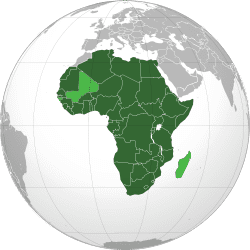Africa has been very successful in integrating itself with the rest of the world, but it has not been successful in integrating countries in the continent. That is why the continent’s organisation felt compelled to organise a summit on ‘Boosting Intra-Africa Trade’ to encourage trade among member states. Christine Chisha, who attended the summit reports.
The launch of the African Union (AU) is a major event in the contemporary history of the continent. In July 1999, the assembly of Heads of State and Government of the Organisation of African Unity (OAU) decided to accelerate the process of economic and political integration of the continent.AU commissioner for Economic Affairs Maxwell Mkwezalamba says the organisation has grown since its establishment in terms of mandate and transformation from OAU to AU.
He said the OAU formed in 1963, focused mostly on politics, to eliminate the last vestiges of colonialism and apartheid strengthen unity and solidarity of African states while the AU is focusing more on trade, economics, integration and infrastructure development.
Dr Mkwezalamba said due to the shift to more economic issues, the budget of the AU which was at US$40 million has increased to US$280 million.
The commissioner for economic affairs indicated that the continental body seeks to encourage intra-Africa trade among its members to enhance Africa’s worldwide competitiveness.
“The benefits of partnerships with India, European Union (EU), China, Turkey and South America are many and helping Africa improve its infrastructure, private sector development, technology and enhances agriculture,” Dr Mkwezalamba said.
The G8 and G20 support to Africa Union member states has resulted for many to increase their quarter from the International Monetary Fund (IMF).
He said this entails more African member states will benefit more resources from the IMF.
With India partnering with Africa, Dr Mkwezalamba pointed out that India has pledged to establish five institutions on agriculture and food security.
He said apart from India helping to eradicate poverty and hunger in Africa, its presence in investment is growing higher and trade volume has continued growing. Dr Mkwezalamba said China was also helping a lot in building roads, rail and schools in Africa.
He said despite trading with other regions, strong trade between AU members is vital to creating jobs and eradicating poverty.
“With trade we are able to look at issues of infrastructure, we are able to look at issues of efficiency in terms of movement of transport within the continent, and we are also able to measure how we are able to export. We can then add value,” he said.
Trade among AU members accounts for about 12 percent of all African trade. In comparison, over 40 percent of all trade on other continents came from buying and selling goods between neighbours in the same region.
AU Deputy chairperson Erastus Mwencha called for immediate action on intra-Africa trade since Africa has the lowest levels of trade of any world region.
He was speaking on the sidelines of the 19th ordinary session of the assembly of Heads of State and Government in Addis Ababa, Ethiopia.
The leaders considered the report of the High Level Committee of Heads of State and Government chairs of the Regional Economic Communities (RECs) under the theme ‘Boosting Intra-African Trade’.
But critics say decisions often taken by African leaders are poorly implemented.
However, Mr Mwencha said the African Union Commission aims to realise its objective of a strong intra-Africa trade.
“We have set our target first of all to create a continental free trade area by 2017, but we are not oblivious to the challenges that we have gone through in the past. There is reason to be optimistic because we now have regional economic communities, which are building themselves into a free trade customs union,” said Mr Mwencha.
He noted that trade was already happening and cited the Southern African Development Community (SADC) and the East African Community (EAC) who are forming a tripartite free trade area, which he said sharply improves trade relations of about 26 countries in both groupings.
“We are encouraging Central Africa, we are encouraging West Africa, North Africa to do similar,” he said.
Mr Mwencha emphasised that Africa should take advantage of the continent’s huge combined markets of the 54 member states.
Minister of Foreign Affairs, Given Lubinda said time has come for African countries to trade amongst themselves.
Mr Lubinda was speaking in Addis Ababa recently when the Zambian government signed bilateral agreements with the Ethiopian government focused on the economic, scientific and technical cooperation.
The bilateral agreements will benefit both countries in conducting exchange of information, expertise, and study tours between development institutions and business communities.
Mr Lubinda said the two countries need to enhance and strengthen intra-Africa diplomatic relations in the spirit of building the spirit of Pan-Africanism.
He said the economic agreement is an opportunity to enhance and deepen relations in front of economic, technological and scientific areas as time has come for Africa to appreciate its own scientists.
“Time has come to start appreciating African scientists, we should recognise and appreciate what they produce and develop and only then can we say that Africa is moving independently,” he said.
The agreements were signed on the sidelines of the 19th session of the Africa Union summit under the theme ‘Boosting intra-African trade.
Mr Lubinda said the agreements between the two countries were a testimony that Africa was on the move.
He pointed out that Zambia was hoping the signing of the agreements will move towards establishing joint permanent commissions to meet once every four years.
Ethiopian Deputy Prime Minister and Minister of Foreign Affairs HaileMariam Desalegne who signed on behalf of Ethiopia, said the agreements will play a catalyst role not only to further strengthening and deepening already existing relations but widen the sphere of cooperation.
Mr Desalegne said both Zambia and Ethiopia face similar development challenges and there was need to strengthen institutional cooperation in areas such as capacity building, poverty alleviation, health and education.
“The agreements signed are a testimony that the new Zambian government wants to continue the existing excellent relations between our two countries. We would like to re-state our confidence and desire that this cooperation and friendship between our two countries will prosper and grows,” he said.
Mr Desalegne said Ethiopia attaches great importance to its relations with Zambia as the two countries have already signed multifaceted cooperation agreements.
Africa’s trade landscape is characterised by a patchwork of trade rules and regulations that make cross-border trade cumbersome and, at times, impossible.
The regulatory environment across the continent would have to be harmonised before Africa could realise its potential as a global trade powerhouse.
Source: http://www.daily-mail.co.zm








